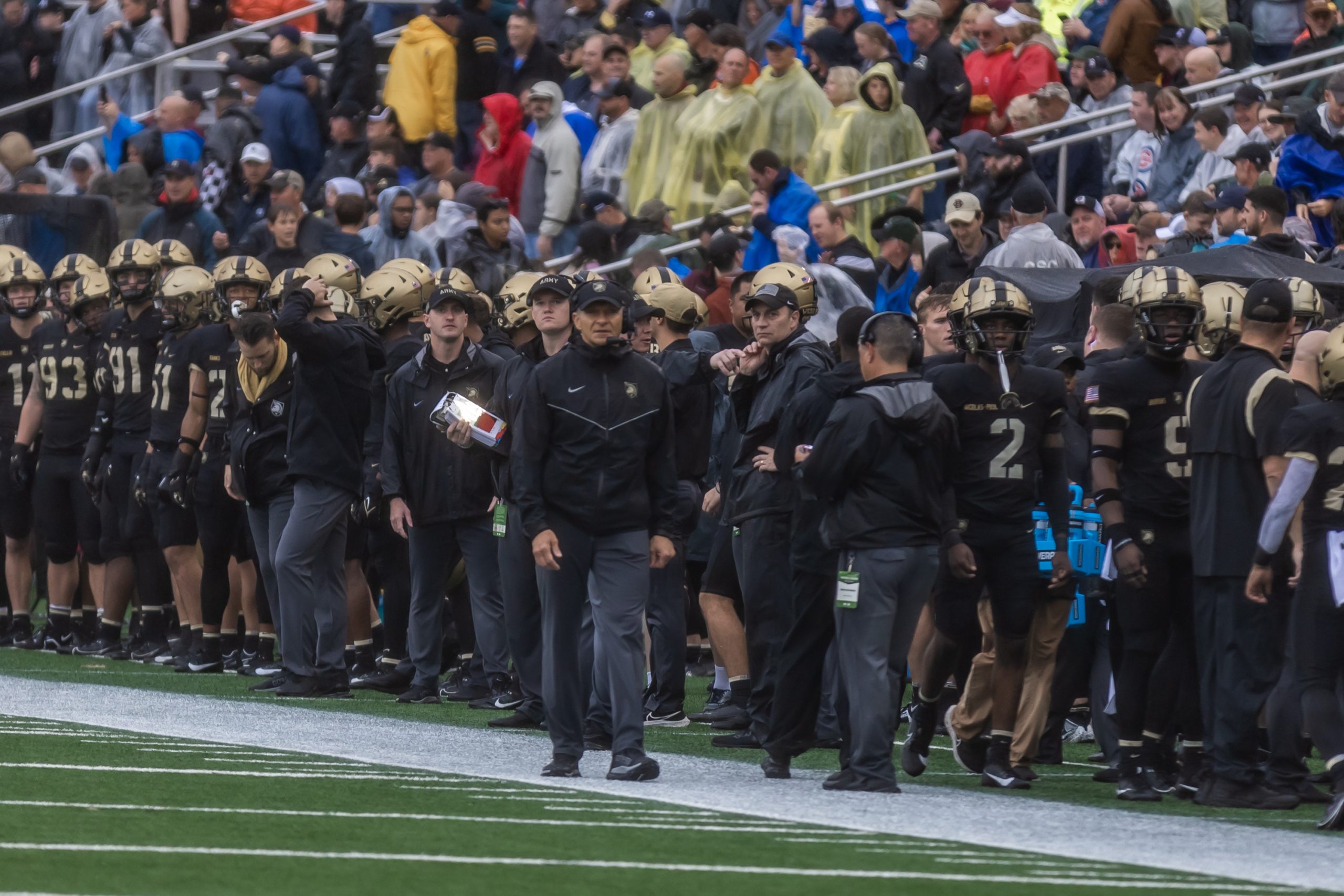Not only has Mike Buddie been doing his homework over the last few years regarding whether West Point should join a football conference, he was making sure that everyone was on board at West Point for a move from a football independent to becoming the 14th member of the American Athletic Conference.
Speaking at a press conference on Wednesday afternoon, Buddie, the West Point athletic director, said he has been in contact with Group of Five conference commissioners since 2018 to get a sense of the changing landscape of college football and to determine if Army had a spot in any conference and was interested.
When the AAC deal materialized in the late summer, he stressed that he sat down with head coach Jeff Monken and 19 of his players that make up Monken’s leadership council. “We had a candid conversation,” Buddie said. “And, to a man they wanted an opportunity to earn all-conference accolades and they wanted to win a conference championship. When they had a year like 2018, when we went 11-2 as independents, there was no true path to the college football playoff.
“I know we are 2-5 right now and I know talking about a college football playoff might seem strange. Kids, who play for the United States Military Academy, want to play for the best possible outcomes that they can. Going 11-2 in the American and playing for a championship, starting in 2024 likely puts you as one of the 12 teams in the college football playoff. Our kids believe that can happen. Jeff Monken believes that can happen and I believe that can happen. Only time will tell.”
Buddie spent much time discussing the financial aspects of the deal. He said there will be a significant immediate revenue increase and added that that Army will become a full football-only member of the AAC, in terms of revenue, in 2032. In the meantime, Army will maintain its television contract with CBS Sports at least through 2028. And, he again confirmed that the Army-Navy game will be a non-league contest, played the week after the conference championship game in December.
“I think it would be awesome to play Army-Navy the first weekend of December for the AAC championship because it means that academy football is alive and well,” he said. “That is important to our country, obviously from my seat. It also means that eight of the last 10 years, the winner of that football game plays in a New Year’s Day bowl game and starting next year it is likely to be playing in a college football playoff game.”
Also, he said that Army is in the process of cancelling as many as 75 to 80 future games. If all those teams demanded full compensation for the cancellation, it could cost Army as much as $35 million. But he explained that about 40 games have already been cancelled without those schools asking for compensation. In the end, Buddie said would not be surprised if the entire cost of cancelling future games is less than $1 million, with the AAC helping out a bit.
While noting that future league and non-league scheduling (Army will play eight league games, plus Navy and Air Force every year) is up in the air, with the exception of the first Saturday in November for the Air Force game, Buddie did say that Army would like to maintain a game against an FCS opponent and one Power Five team, if possible, next year.
Lehigh and Dartmouth were on the schedule. And, he mentioned that there is one game that has not been announced yet that he would like to keep. It has been rumored that Army and Notre Dame are close to signing a deal to play next November at Yankee Stadium.
Buddie is high on the AAC, noting that five schools located in top 25 media markets, plus other schools that are in the most patriotic regions of the country. It will help Army in terms of recruiting and could help some schools, particularly in Texas (UTSA, North Texas, Rice) attract more Army fans to their home games.
“Neither side was overly passionately, desperately wanting this to happen,” he said. “The American clearly wanted Army if they were going to go to 14, Army was their clear choice. But they also knew there were a lot of options for their 14th team. On our side, we thought we are happy being an independent and we were not in desperation of having to join a conference. It actually made it a less stressful negotiation.”
And what about the concerns of some Army fans who lived through the Black Knights time in the Conference USA, where Army went just 9-40 before bailing out of the league after the 2004 season.
“Absolutely there is concern,” he said. “What I believe in my heart, and I made the decision so clearly I am willing to put my own personal stake in it, this program is in a completely different place than it was in 1997. Jeff Monken has us competitive in every aspect of college football, recruiting, our strength facility, our lockerroom facilities, our nutrition commitments. All of those things that are in place. When you look at those teams currently competing in the American, from Alabama-Birmingham, to Rice, to UNC-Charlotte to Memphis and South Florida, we are not at a disadvantage.”
Buddie added, “Only time will tell. I don’t believe this is going to be Conference USA Part Two…I’m committed and convicted that this is the right time and we’re in a position now that is going to set us up for success.”














Pingback: College Realignment Report for October 31, 2023 - Sports Enthusiasts